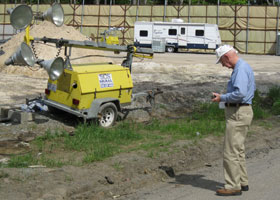Pennsylvanians Say Stop Fracking

The stretch of road on Route 711 in Pennsylvania between Ligonier and New Florence is one of the most picturesque in the entire state. Carl Whipkey, 84, a World War II veteran, and his wife Gloria, 80, a three-time cancer survivor, moved to their Ross Mountain Park Road home in 1974 with every intention of peacefully living out the rest of their days on the serene 30-acre lot. Now, thanks to a natural gas drilling site next door, the Whipkeys, who celebrated their sixtieth wedding anniversary in May, would give anything to have back the simple backyard picnics and barbeques with their great grandchildren, or even an undisturbed night’s sleep. The smell and noise of XTO Energy’s drilling make such comforts impossible. And the Whipkeys are not alone.
It is almost unimaginable that 18 months after the BP oil disaster in the Gulf, homeowners across the northeast would welcome companies from the oil and gas industry into their backyards. Although the Whipkeys weren’t given a choice—the well site is on a neighbor’s property (an absentee landowner). When a XTO representative (XTO Energy Inc. was acquired by Exxon Mobile Corporation in 2010) came to offer them a contract for the gas rights to their land, the couple was given a shotgun deal. According to Carl, the representative informed them, “‘We’re going to be taking the gas out from underneath your property and if you sign a contract with us you will get paid some royalties. If you don’t sign a contract with us, we’ll still take the gas out from underneath your property.’ Sort of one of those deals you can’t really refuse.”
Nor were XTO representatives particularly honest with the couple prior to drilling, assuring them that the drilling site would be a half mile away, and not the mere 230 feet away it sits now, on a hill above their home. “We didn’t have a clue anything would be going on beside us until one afternoon we returned from the doctors and they’re up here running chainsaws,” Carl says.
OPEN FOR DRILLING

Pennsylvania state law allows drilling to take place within 200 feet of an occupied building. But Pennsylvania’s Oil & Gas Act dates back more than 100 years and was written with shallow gas wells or conventional drilling in mind. Myron Arnowitt, the Pennsylvania state director at Clean Water Action, says, “Some of the regulations that were in place here in Pennsylvania were really inadequate. Marcellus Shale drilling is of such a bigger magnitude [than the law addresses].” With no regulation in place, it’s families like the Whipkeys who suffer
“The first well was so loud,” remembers Carl. “They had four big diesel power generators to power the well sitting about 80 yards from our bedroom window. I have Styrofoam sheet insulation on our bedroom windows to block the noise, but it still got so bad we had to move to the bedroom to the front of the house. So we moved in there, and in the process, they began lining trucks up in front of the house. Big diesel trucks idling, diesel fumes blowing around. All night.” Adds Gloria: “All night! You wouldn’t believe what goes on here after dark.”
“Once the drilling process is complete, the fracking begins,” Carl continues. “They bring in 75 huge blue water tankers, set them up around the perimeter and have them all connected together, then fill them up with water and use three to five million gallons of water mixed with their secret chemicals and sand.”
INDUSTRIAL OPERATIONS
Conrad Daniel Volz, Ph.D., has studied gas drilling extensively and recently stepped down from his post as director of the Center for Healthy Environments and Communities at the University of Pittsburgh’s Graduate School of Public Health in order to speak out more openly in opposition to hydraulic fracturing. “In response to the industry line that natural gas is a safe energy source, Volz says: “This is a highly industrialized operation. They use millions of gallons of water and tons of different kinds of chemicals, and many of those chemicals have to be made from oil and gas. It takes carbon.” To make these chemicals and transport everything to the well sites, Volz says, requires burning coal. Besides the heavy energy costs, he adds, “all of the toxic flowback water that comes out needs to be cleaned, and that takes energy. So just on the face of it, we are using far more energy to get this gas out of the ground than the natural gas that we’re used to. This [Marcellus] natural gas on the whole is not cleaner than the natural gas that we know of.”

While constituents line up from afar alongside their respective political party members on the gas drilling issue, it’s the families up close who must suffer the consequences. The Whipkeys only wish the politicians would do what’s right, regardless of party.
“It wasn’t Muir Woods or the redwood forest, it was just plain old Pennsylvania woods,” Gloria says of their land. “We came home and there are people in there with bulldozers pushing trees down. In there with chainsaws and everything. So we went over to this nice gentleman from Oklahoma and said ‘What are you doing?’ He said, ‘We’re clearing out these woods.’ ‘What on earth for?’ ‘We’re drilling a gas well.’ And I said ‘Please… all those pine trees I planted as babies, and they’re on our property,’ I said ‘Please don’t do anything to my babies, my pine trees.’”
DON’T EXPECT PROTECTION
Upon completion of the first well, the Whipkeys turned to the Pennsylvania Department of Environmental Protection (DEP) for assistance. In a letter to the DEP this past July, Mr. Whipkey urged the agency to step in, writing how he felt like a prisoner in his own home on account of the strong toxic odor, noise and dust coming from the well site. But Carl says the DEP has sided with the gas company at every turn. Some in the region even refer to the agency’s initials as standing for “Don’t Expect Protection.”
Carl reported a frack fluid spill at the site to the DEP in April of 2010 and on August 4, 2010 and XTO was formerly cited for four other violations at the well site (known as the Flickinger Well): discharging industrial waste into state waters; discharging pollution-causing material into state waters; doing so without a permit; and failing to notify the department of the pollution. (The DEP declined repeated requests for comment for this story.)
Still, the DEP allowed the company another permit to drill on the site. As Carl wrote in his letter, “Why would the DEP want to issue another drilling permit on the same well site to a disreputable, untrustworthy company that tried to hide a fracking accident?” At the time of this writing, during the burn-off process of the second well, with a 100-foot flame shooting into the sky above the trees next door, the Whipkeys were finally forced from their home. The noise was simply too much to endure and the couple temporarily sought shelter elsewhere
Carl calls the ordeal “a two-year interruption of life.” The 84-year-old now spends most of his time writing letters and making phone calls and trying with everything he has to prevent a third well from being drilled.
AARON SKIRBOLL is the author of The Pittsburgh Cocaine Seven: How a Ragtag Group of Fans Took the Fall for Major League Baseball (Chicago Review Press).

